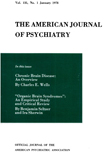The impact of medical school on future psychiatrists
Abstract
Although psychiatry and clinical medicine share ideals about what distinguishes a good practitioner, medical schools do not select students on the basis of these qualities. Moreover, they seem to discourage many interested students from choosing psychiatry. Part of the problem is that psychiatry is poorly taught. Research suggests that psychiatry can be better taught and that medical students will be receptive. However, the clash between the values of technological medicine and psychiatry has created discouragement, with the ironic result that medical students rate psychiatrists poorly because they embody the very qualities that distinguish the good clinician.
Access content
To read the fulltext, please use one of the options below to sign in or purchase access.- Personal login
- Institutional Login
- Sign in via OpenAthens
- Register for access
-
Please login/register if you wish to pair your device and check access availability.
Not a subscriber?
PsychiatryOnline subscription options offer access to the DSM-5 library, books, journals, CME, and patient resources. This all-in-one virtual library provides psychiatrists and mental health professionals with key resources for diagnosis, treatment, research, and professional development.
Need more help? PsychiatryOnline Customer Service may be reached by emailing [email protected] or by calling 800-368-5777 (in the U.S.) or 703-907-7322 (outside the U.S.).



